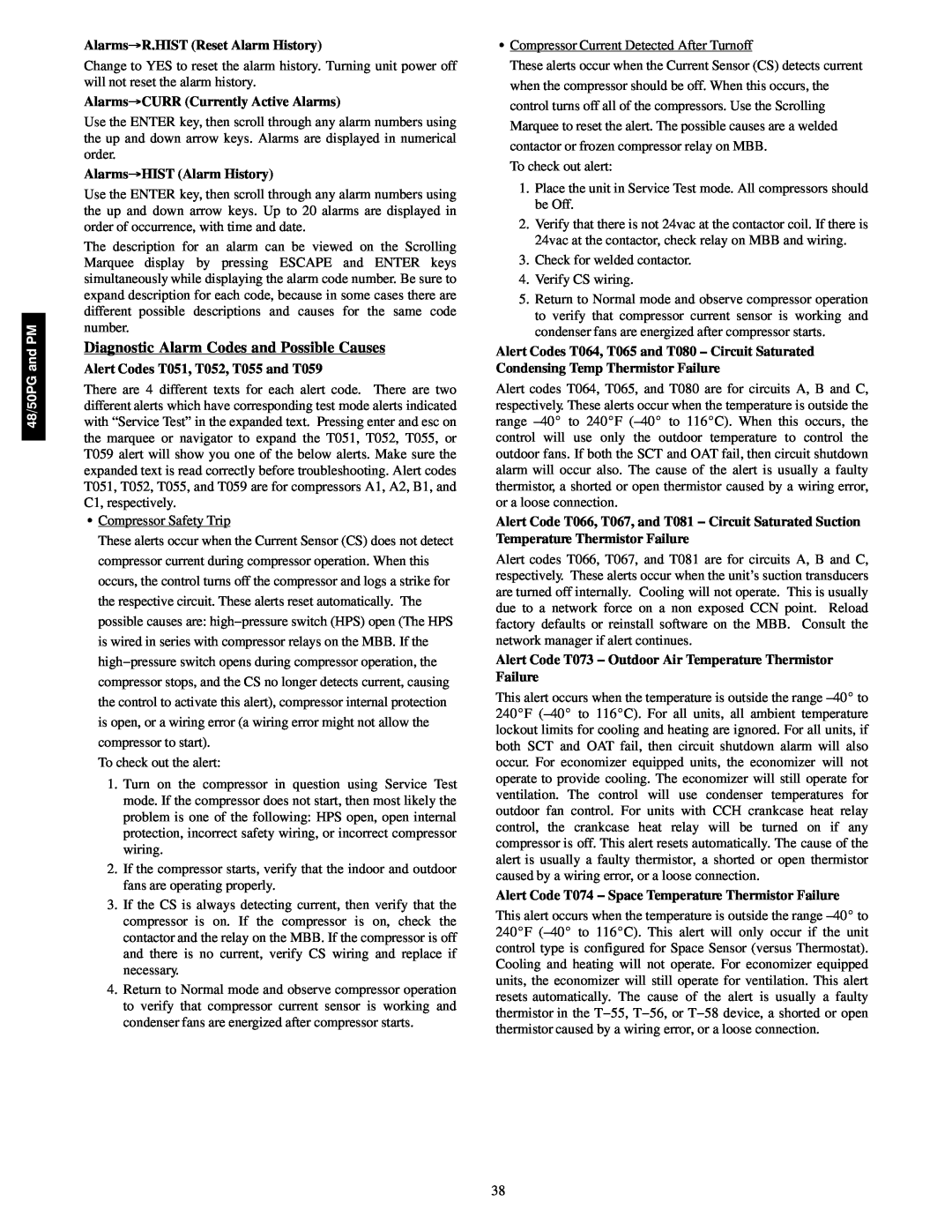48/50PG and PM
Alarms"R.HIST (Reset Alarm History)
Change to YES to reset the alarm history. Turning unit power off will not reset the alarm history.
Alarms"CURR (Currently Active Alarms)
Use the ENTER key, then scroll through any alarm numbers using the up and down arrow keys. Alarms are displayed in numerical order.
Alarms"HIST (Alarm History)
Use the ENTER key, then scroll through any alarm numbers using the up and down arrow keys. Up to 20 alarms are displayed in order of occurrence, with time and date.
The description for an alarm can be viewed on the Scrolling Marquee display by pressing ESCAPE and ENTER keys simultaneously while displaying the alarm code number. Be sure to expand description for each code, because in some cases there are different possible descriptions and causes for the same code number.
Diagnostic Alarm Codes and Possible Causes
Alert Codes T051, T052, T055 and T059
There are 4 different texts for each alert code. There are two different alerts which have corresponding test mode alerts indicated with “Service Test” in the expanded text. Pressing enter and esc on the marquee or navigator to expand the T051, T052, T055, or T059 alert will show you one of the below alerts. Make sure the expanded text is read correctly before troubleshooting. Alert codes T051, T052, T055, and T059 are for compressors A1, A2, B1, and C1, respectively.
SCompressor Safety Trip
These alerts occur when the Current Sensor (CS) does not detect compressor current during compressor operation. When this occurs, the control turns off the compressor and logs a strike for the respective circuit. These alerts reset automatically. The possible causes are: high−pressure switch (HPS) open (The HPS is wired in series with compressor relays on the MBB. If the high−pressure switch opens during compressor operation, the compressor stops, and the CS no longer detects current, causing the control to activate this alert), compressor internal protection is open, or a wiring error (a wiring error might not allow the compressor to start).
To check out the alert:
1.Turn on the compressor in question using Service Test mode. If the compressor does not start, then most likely the problem is one of the following: HPS open, open internal protection, incorrect safety wiring, or incorrect compressor wiring.
2.If the compressor starts, verify that the indoor and outdoor fans are operating properly.
3.If the CS is always detecting current, then verify that the compressor is on. If the compressor is on, check the contactor and the relay on the MBB. If the compressor is off and there is no current, verify CS wiring and replace if necessary.
4.Return to Normal mode and observe compressor operation to verify that compressor current sensor is working and condenser fans are energized after compressor starts.
SCompressor Current Detected After Turnoff
These alerts occur when the Current Sensor (CS) detects current when the compressor should be off. When this occurs, the control turns off all of the compressors. Use the Scrolling Marquee to reset the alert. The possible causes are a welded contactor or frozen compressor relay on MBB.
To check out alert:
1.Place the unit in Service Test mode. All compressors should be Off.
2.Verify that there is not 24vac at the contactor coil. If there is 24vac at the contactor, check relay on MBB and wiring.
3.Check for welded contactor.
4.Verify CS wiring.
5.Return to Normal mode and observe compressor operation to verify that compressor current sensor is working and condenser fans are energized after compressor starts.
Alert Codes T064, T065 and T080 – Circuit Saturated Condensing Temp Thermistor Failure
Alert codes T064, T065, and T080 are for circuits A, B and C, respectively. These alerts occur when the temperature is outside the range
Alert Code T066, T067, and T081 − Circuit Saturated Suction Temperature Thermistor Failure
Alert codes T066, T067, and T081 are for circuits A, B and C, respectively. These alerts occur when the unit’s suction transducers are turned off internally. Cooling will not operate. This is usually due to a network force on a non exposed CCN point. Reload factory defaults or reinstall software on the MBB. Consult the network manager if alert continues.
Alert Code T073 − Outdoor Air Temperature Thermistor Failure
This alert occurs when the temperature is outside the range
Alert Code T074 − Space Temperature Thermistor Failure
This alert occurs when the temperature is outside the range
38
